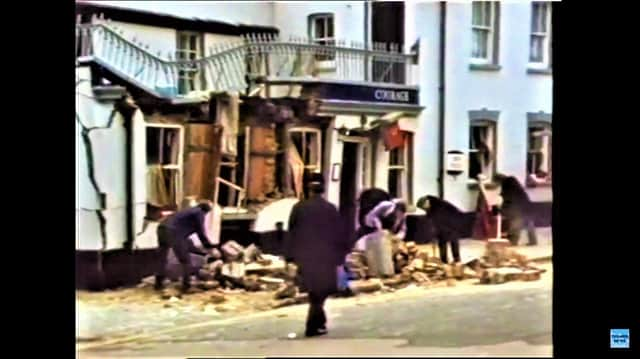Guildford pub bombings: Inquest into IRA atrocity to start next month


The hearing concerns the deaths of four soldiers and a civilian after IRA bombs were detonated in two pubs in a terror attack 47 years ago.
Counsel to the inquest Oliver Sanders QC said there will be 16 days scheduled, with four days reserved for submissions and summing up.
Advertisement
Hide AdAdvertisement
Hide AdCoroner Richard Travers confirmed on Friday: “The next hearing will be the first day of the hearing on 20 June.”
A number of witnesses have since died and so will not be able to give spoken evidence at the hearing, Surrey Coroner’s Court heard.
Statements given while they were alive will be read to the inquest.
A handful of other witnesses have asked to give evidence by video link due to health or mobility issues, the court heard.
Advertisement
Hide AdAdvertisement
Hide AdMr Sanders said the inquest will also hear a statement from an “emergency respondent” who was “very traumatised” by the aftermath of the bombing.
The inquest will also hear Ministry of Defence evidence about security procedures in the military at the time.
The BBC made an application to see two expert reports – one written by a Ms Hill for the MoD, the other by historian Professor Thomas Hennessey – before they are read at the inquest.
The broadcaster argued they are complex documents and it will aid reporting to read them a few days in advance.
Advertisement
Hide AdAdvertisement
Hide AdMr Travers said he would consider the proposal once Ms Hill’s report has gone through a process of security checks.
He said that, were he to permit the reports to be read early by the BBC, only the evidence read from the reports in the inquest could then be reported on.
At a pre-inquest review hearing in January, the coroner ruled the inquest would sit without a jury.
Mr Travers also previously said he saw no reason for the process to be held as an Article 2 inquest, which would have helped the victims’ families receive legal aid.
Advertisement
Hide AdAdvertisement
Hide AdArticle 2 inquests, also known as Middleton inquests, are held when the state fails to protect individuals from a “real and immediate” threat to their lives.
The Legal Aid, Sentencing and Punishment of Offenders Act 2012 only allows legal aid to be granted for inquests with a wider public interest, or for Middleton inquests.
On October 5 1974, bombs exploded in the Horse and Groom and the Seven Stars, killing Ann Hamilton, Caroline Slater, William Forsyth, John Hunter and Paul Craig.
A further 65 people were injured.
Eleven people – the Guildford Four and the Maguire Seven – were found guilty over the atrocity but their convictions were later quashed.
Advertisement
Hide AdAdvertisement
Hide AdIn 1976, IRA members Brendan Dowd and Martin Joseph O’Connell admitted carrying out the bombings but were never charged as both had been imprisoned in the 1970s for other offences and freed during the Northern Ireland peace process.